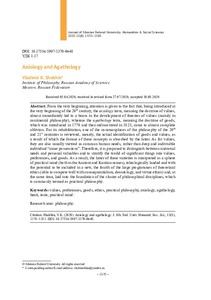Axiology and Agathology
Скачать файл:
URI (для ссылок/цитирований):
https://elib.sfu-kras.ru/handle/2311/135928Автор:
Shokhin, Vladimir K.
Шохин, В.К.
Дата:
2020-08Журнал:
Журнал Сибирского федерального университета. Гуманитарные науки. Journal of Siberian Federal University. Humanities & Social Sciences; 2020 13 (8)Аннотация:
From the very beginning, attention is given to the fact that, being introduced at
the very beginning of the 20th century, the axiology term, meaning the doctrine of values,
almost immediately led to a boom in the development of theories of values (mainly in
continental philosophy), whereas the agathology term, meaning the doctrine of goods,
which was introduced in 1770 and then rediscovered in 1823, came to almost complete
oblivion. For its rehabilitation, one of the commonplaces of the philosophy of the 20th
and 21st centuries is reviewed, namely, the actual identification of goods and values, as
a result of which the former of these concepts is absorbed by the latter. As for values,
they are also usually viewed as common human needs, rather than deep and indivisible
individual “inner possessions”. Therefore, it is proposed to distinguish between universal
needs and personal valuables and to stratify the world of significant things into values,
preferences, and goods. As a result, the latter of these varieties is interpreted as a sphere
of practical mind (both in the Ancient and Kantian senses), teleologically loaded and with
the potential to be included in a new, the fourth of the large programmes of theoretical
ethics (able to compete well with consequentialism, deontology, and virtue ethics) and, at
the same time, laid into the foundation of the cluster of philosophical disciplines, which
is commonly termed as practical philosophy Внимание с самого начала привлекается к тому факту, что термин
аксиология, означающий учение о ценностях, будучи введенным в самом начале
ХХ века, почти сразу повлек за собой целый бум разработок теорий ценностей (преимущественно в континентальной философии), тогда как термин агатология, означающий учение о благах и созданный в 1770, а затем открытый заново в 1823 году,
пришел в почти полное забвение. С целью его реабилитации пересматривается
одно из общих мест философии ХХ и XXI веков, а именно фактическое отождествление благ и ценностей, вследствие которого первое из этих понятий фактически
поглощается вторым. Но то, что считается ценностями, также, как правило, клишированно понимается как общие человеческие потребности, а не глубинные и неделимые индивидуальные «внутренние обладания». Поэтому предлагается различать
общечеловеческие потребности и личностные значимости и стратифицировать мир
значимостей посредством дифференциации ценностей, преференций и благ. В результате последняя из этих разновидностей трактуется как сфера практического
разума (в античном и в кантовском смыслах), телеологически нагруженная и могущая быть заложенной в новую, четвертую из больших программ теоретической
этики (способную хорошо конкурировать консеквенционизмом, деонтологизмом
и этикой добродетели) и одновременно в общий фундамент того кластера философских дисциплин, который принято называть практической философией

